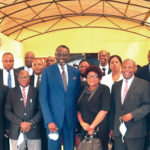If the infamy that recently took place at the Obafemi Awolowo University (OAU), Ile-Ife, for several days when some indigenes and traditionalists invaded the hallowed campus to protest the appointment of a non-Ife indigene as the vice chancellor of the institution illustrates anything, it is the fact that Nigeria’s universities are in urgent need of a rescue from primitive persuasions. The protesters disrupted the peace and tranquility of the university community with fetish objects as they embarked on violent processions around the campus, calling for the reversal of the decision by the university’s governing council appointing Professor Adebayo Bamire as the 12th vice chancellor of the institution. Although not an Ife indigene, Professor Bamire hails from Odo-Otin Local Government Area of Osun State. He beats 15 other professors in the selection contest. As one of Nigeria’s first-generation universities, the OAU is listed among the few prestigious institutions in Nigeria. The invasion was greeted with public opprobrium and condemnation and the barbaric drama ended quickly, as even the association of traditionalists in Osun State dissociated itself from it and condemned it in stark terms.
The invasion, deplorable as it is, is actually reflective of the quagmire in which Nigerian universities and institutions of higher learning in general are mired. And it is time to rethink and redefine the very concept of universities. Although the invasion ceased on the strength of public disgust, the event clearly shows the deep erosion of university values across the country. The problem is not that university campuses should not be sites of legitimate protests. That would be an unrealistic expectation in a democracy. Democracy certainly does allow peaceful protests. The problem, quite simply, is that the country’s universities have become so bastardised that all sorts of extraneous forces see them as their private property and sponsor ludicrous practices, including assaults, on their premises. The values of the university as an institution have been eroded by many of the actions taken by the leadership of universities and the government over the years. A major step in this regard was the incorporation of the university system into the political patronage network in the country. Each university is now perceived to be largesse, a part of the national cake by indigenes of the location where it is sited. Thus, such communities have come to believe that university positions should be occupied by indigenes as part of their share of the national cake. Offices within the universities are then exploited for personal and group gain. This explains the increasing cases of corruption in the university system, a situation which was bemoaned by the Association of Vice Chancellors of Nigerian Universities at its 24th meeting as a major bane of the university system.
Worse still, rather than work towards ensuring that universities are properly funded and governed, the federal and state governments have rapidly increased the number of universities as if they are in competition to ensure that every legislator or governor has a university in his or her village. In the last 10 years, over a hundred universities have been established in an environment and context in which lecturers are few, laboratories and research activities are underfunded and infrastructure is in decay without the resources to maintain them. The establishment of numerous universities is done to increase administrative positions to be occupied by indigenes in Nigeria’s cake-sharing federal arrangement. The absence of infrastructure means that these universities are unable to significantly increase access, and that they downgrade the standards of academic work. Salaries are so poor that many of the available academic staff exit the country for greener pastures, including in several countries on the African continent where the conditions of service for academic staff are far better than those in Nigeria.
The invasion of universities such as the OAU and the leadership ruckus witnessed in many universities across the country are therefore a symptom of the ‘villagisation’ of universities through the new conception of universities as constituency projects by the political decision-makers who are saddled with the responsibility of establishing and overseeing the university system at the highest levels. Accordingly, practices within the universities tend to follow this logic with varying degrees of intensity. It is common to find staff of universities being largely composed of indigenes of the localities in which they are sited. Gone are the days when universities in Nigeria attracted lecturers from diverse parts of Nigeria, including lecturers from other African countries and the developed world. Universities have become ethnicised in outlook. This is quite tragic.
Universities should not be created or used as instruments of political patronage, or as an opportunity for people to loot public funds. Universities are so important that they define their location, not the other way round. By their research, innovations, universal outlook and emphasis on merit, they represent a vital asset of their location and the country at large. The idea of university towns is to create cosmopolitan centres of innovation, creativity and knowledge production. Indigenes of university towns should take pride in having globally competitive and well governed institutions by showing interest in the promotion of merit and accountability in the management of universities. It is common to celebrate Nigerians who are appointed to top positions in universities in the developed world. Why not do the same for non-indigenes and foreigners who are appointed to such positions in Nigeria?
Stakeholders in the university system should not copy the examples from within the country. Rather, they should emulate practices that contribute to achieving the purpose of universities worldwide. That is the way to make Nigerian universities sound, globally competitive, socially productive and relevant.
ALSO READ FROM NIGERIAN TRIBUNE
- Bandits Storm Kaduna Airport, Stop Aircraft From Taking Off
- Lagos Socialite Who Distributed Petrol As Souvenir Sentenced To Two Years Imprisonment, Gets Fine Option
“Absolutely, When we came with the Buhari government in 2015 I became the minister. We were committed to a roadmap to establish a National Carrier, to concession the airports, to set up a leasing company, to establish cargo facilities and we have been doing that.”
On why the Buhari government wanted a national carrier, the minister responded: “Nigeria is situated at the centre of Africa, equidistant from all locations in Africa. 30.4 million square kilometres miles, 1.5 billion people, very green land. If Central and Eastern Africa is the belt of the continent, then Nigeria is the buckle. 200 million people and rising middle class, propensity to fly is high. Nigeria is a candidate for National Carrier.”
Sirika who insisted that the coming national carrier will be private sector driven added; “Private. Yes. 5 per cent government and no government stepping right in that company, no government control, no membership of government on board. Totally private and committed.
“Whatever we say we will do as a government since 2015, it has happened. that is why Tim Clark of Emirates, Qatar Airways and all of them are looking to go into Nigeria in multiple frequencies and multiple landing points because Nigeria is the right place for the airline business.
How Workplace Sexual Harassment Forces Many Out Of Their Dream Jobs
FG expresses commitment towards private driven aviation sector






